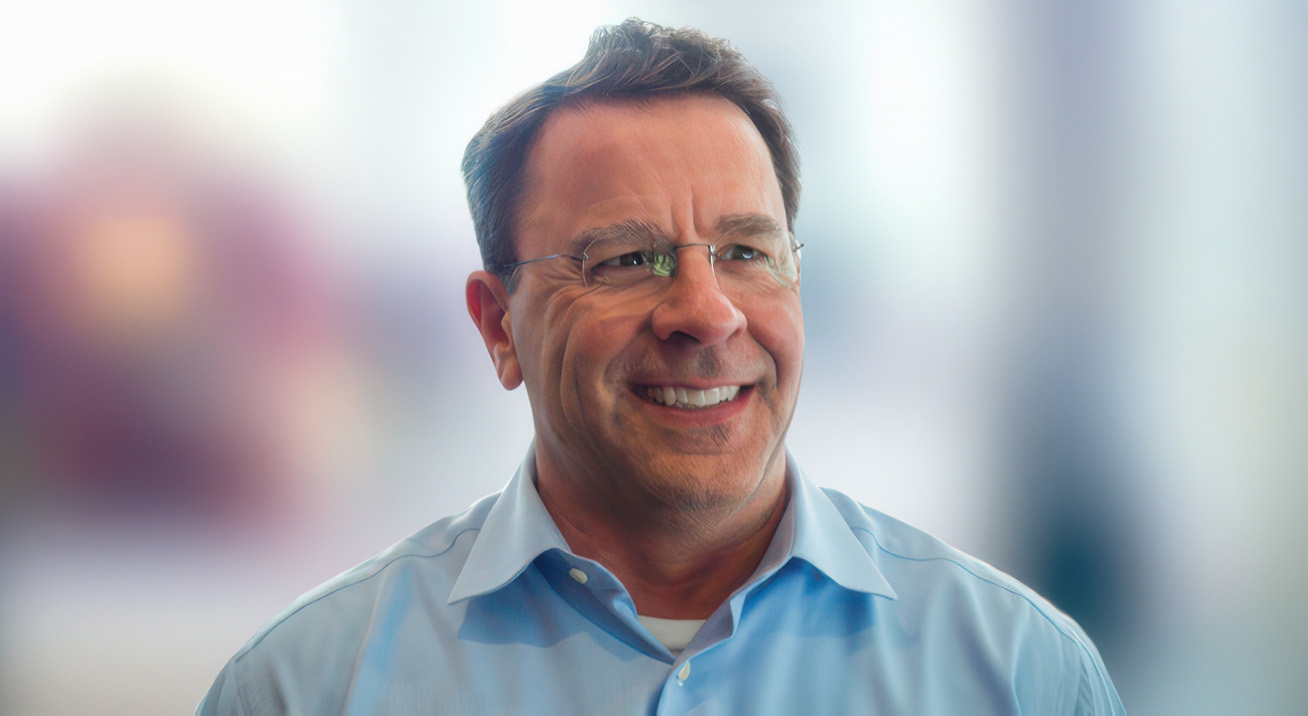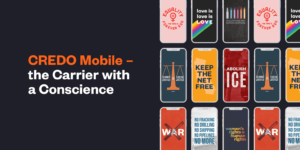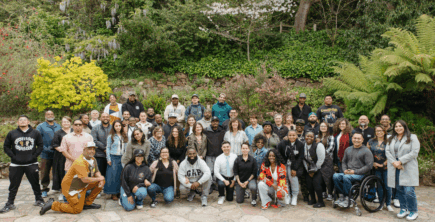
LGBT

Ray Morris, CEO, Credo
CREDO is a for-profit company that powers social activism by engaging in advocacy campaigns and making direct contributions–over $87 million since its founding–to progressive organizations. CREDO offers mobile services and clean energy to its customers and commits a portion of its revenue to donations for progressive groups. The donations are distributed monthly, according to a vote by CREDO’s members.
We sat down with CEO Ray Morris to learn about the challenges of this incredible commitment and why it matters to integrate social impact into your core business model.
April Suwalsky: Founded in 1985, CREDO has long been at the forefront of socially conscious business, with a commitment to a triple bottom line built in to its business model. Tell us a bit about what you do, the customers you serve, and what makes CREDO unique?
Ray Morris, CREDO Mobile: CREDO is unique because we were founded with the specific mission to create progressive social change through donations and activism. Unlike other businesses with philanthropy add-ons to their products, CREDO’s donations program is at the core of our business model. Without it, we have no reason to keep our doors open. And it’s exactly why our customers choose us. Every member who purchases a product or service from CREDO – whether that’s CREDO Mobile, CREDO Energy, the Working Assets Credit Card, or Long Distance – believes fiercely in our mission of powering progressive change. Because of that, our customers are loyal and quite frankly, demanding as well; and we wouldn’t have it any other way.
AS: Maintaining this commitment for so long was likely not without its challenges over the years. What lessons on driving social impact as a for-profit business have you learned from your work?
RM: As our co-founder Laura Scher said in a 1993 New York Times interview, CREDO is “based on the premise that generosity can be painless if it is linked to purchases people are already making and bills they regularly pay.” We know that if we can turn bills people don’t love paying into ones they can be proud of, we can have that much bigger of an impact. By offering products and services that our customers already use everyday, we’re able to take some of those profits and put it into the causes and activism that fight for causes we all care about. And because it’s built into our business model, living up to our mission of creating progressive change through donations and activism is never difficult.
We know that if we can turn bills people don’t love paying into ones they can be proud of, we can have that much bigger of an impact.
More challenging (and interesting) is evolving our business model. We started with long distance phone service and credit cards, and have evolved to mobile phone services and recently, CREDO Energy. We have done this to ensure our company stays focused on what’s important to our members and get more progressive customers involved with our mission.
AS: How does CREDO connect its customers, employees, and the broader public community to progressive social change?
RM: Activism, activism, activism. Just last year, we launched more than 300 campaigns to mobilize our 5+ million activist network, generating 27 million petition signatures, making more than 114,000 calls to Congress, and supporting a dozens of protests, rallies, and other in-person events to fight for progressive change.
For example, CREDO team members and activists led a protest last year outside the home of then-DHS Secretary Kirstjen Nielsen to protest her implementation of this administration’s cruel and inhumane family separation policy. Dozens of media outlets reported on the protest, and a video of the event went viral. In the fall, two senior CREDO employees were arrested protesting inside the hearing room on Capitol Hill during Brett Kavanaugh’s Supreme Court confirmation hearing.
We live our values loudly, and we empower our members to live theirs loudly, too.
AS: Sometimes Corporate Social Responsibility (CSR) staff need to navigate internal organizational challenges and/or advocate for their social impact programs with company leadership within their companies, regardless of whether or not the company is “mission-driven.” Do you have recommendations for how CSR staff can best position their social impact programs as essential to core business success and sustainability?
RM: We believe that good CSR programs are data-driven and work symbiotically with the business side of the organization. From a practical perspective, CSR experts should work closely with the marketing, analytics, and finance teams to better understand the goals of the business, over both the short and long term. With that knowledge, CSR teams can better demonstrate how their CSR programs not only further corporate goals, but that they are core to them.
Good CSR programs are data-driven and work symbiotically with the business side of the organization…With that knowledge, CSR teams can better demonstrate how their CSR programs not only further corporate goals, but that they are core to them.
However, companies shouldn’t just use CSR programs as window dressing or a reaction to pressure from customer whims. Many brands today are demonstrating that consumers will make choices based on their values, even in the least mission-driven companies, and marketers are paying attention to this shift in consumer sentiment. It’s our hope these companies react to these shifts authentically, or even change their core missions, because in our experience, values-driven customers are extremely savvy and know when a brand is being true to its values.
AS: As the advocacy arm of CREDO, CREDO Action is critical to mobilizing customers and non-customers on progressive social issues. What advice do you have for other mission-driven companies that may be considering advocacy campaigns as part of their business strategies, or simply are attempting to be more vocal publicly?
RM: With brands taking more public political stands on social issues in response to the racist, misogynist, and greed-driven policies of the current administration, it’s our hope that companies who decide to mobilize their customers do so thoughtfully and authentically. We’ve seen some brands engage customers quite well, while others are simply piggy-backing off genuine grassroots movements to increase sales. We believe it’s more powerful when the message is relevant to the brand and when the company’s employees and customers believe in the mission.
We believe it’s more powerful when the message is relevant to the brand and when the company’s employees and customers believe in the mission.
We suggest that mission-driven companies that are considering advocacy campaigns resource appropriately and build partnerships. Hire talented organizers with strong backgrounds in activism and digital campaigning who have deep relationships with partner organizations related to the company’s core mission. At CREDO, we partner with hundreds of nonprofits and activist organizations who know we’ll be there when they need us in the fight. Those relationships are key to our ability to rapidly deploy our resources effectively on behalf of our members.
AS: Recently, CREDO expanded its core business beyond CREDO Mobile to include CREDO Energy. What was the thinking around this, and what have been some of the successes and challenges? How does that help CREDO expand its impact?
RM: As consumer trends–and particularly technology–rapidly change, CREDO continually evolves our product offerings. We have a base of loyal, committed progressives who are eager to purchase more products from CREDO, and we’ve responded to their requests as well as to broader market demands.
With CREDO Energy, we are wholly aligning our company’s values with a product we can offer our customers–a product they’ve been asking us to provide for years. And we see it as a natural extension of our values: for years, we have funded progressive groups fighting for climate justice. At the same time, our activism team has won huge victories in stopping dirty fossil fuel infrastructure projects and pushing bold climate legislation. Offering 100% renewable energy to our members is the logical next step for our business.

AS: As a company, what are your proudest accomplishments? Could you share a favorite partner or grantee story?
RM: Having consistently donated to progressive organizations for more than 34 years now, we’re extremely proud to have exceeded $87 million in donations to groups like Planned Parenthood, 350.org, the ACLU, Social Security Works, the National LGBTQ Task Force, and Color Of Change. In light of the current administration’s cruel policies toward immigrants, we’re proud to have been a leader in funding immigrant rights groups including United We Dream, Women’s Refugee Commission, Detention Watch Network, Florida Immigrant Coalition, and Muslim Advocates.
AS: Tides has been honored to partner with CREDO since 1988. How has working with Tides supported and furthered your work and impact?
RM: As partners in the progressive movement, we share a similar mission to lift up nonprofits and advocacy groups doing the important front-line work that supports so many communities. Tides has been an important part of our donations program over the years by being a thoughtful, strategic partner and providing a vehicle for tax-deductible money from our members to the organizations that we grant to.
AS: What’s next for CREDO and the impact you’re driving in the world?
RM: More products to expand our reach and impact. We launched CREDO Energy in mid-2018 and have been expanding its footprint since then. We’re now in nine states with more coming. And we have more products in the wings, including platforms that will provide more means to connect with our members and build community. You’ll see the start of this with the new CREDOMobile.com website launching in May.

LGBT

Corporate Partners

Philanthropy

Read the stories and hear the voices of social change leaders fighting for justice.